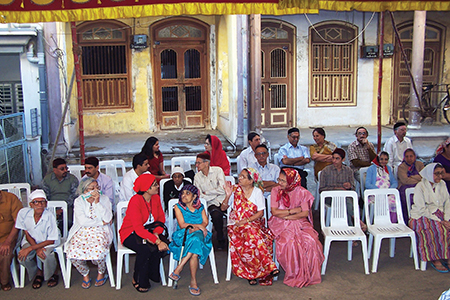Wholesome, peaceful and pure
Berjis Desai
At dawn, lying in bed, you heard the sound of water, drawn from the house well, being splashed to settle the dust outside the entrance. Followed by the sound of the auspicious box containing limestone powder being smacked on the ground to produce designs (chalk purya). The huge brass boiler gurgled ominously in the paachloon bar (back entrance) heated by chopped wood and charcoal. You cleaned your teeth with crushed twigs from the neem tree. Maybe, some monkey brand tooth powder from a tin on which a happy monkey grinned, displaying his sparkling white teeth.
The fire in the kitchen was fuelled just like the brass boiler. The large aluminum kettle took some time to boil. A spoonful of tea leaves, lemon grass and mint leaves in a no nonsense white teapot awaited the hot water from the kettle. Milk was delivered at your doorstep, just like fish and mutton and veggies. The brood of hens, fluttering all over the paachloon bar, would provide fresh eggs and, of course, chicken. The rooster, angel of dawn, enjoyed immunity from execution. He was your pre-dawn alarm clock anyway. You dunked your rough, largish, drum shaped batasa biscuit from Surat into your tea. Quarter of the cup would be absorbed by the batasa, to be rescued just in time, from turning soggy. The mint and lemon grass cleared your sinuses and yet another day had begun in one of the many Parsi mohallas of Navsari.

Community members in a Parsi mohalla in Navsari
Parsi homestead in Navsari
Your biceps were exercised by pulling water from the well, one of the holiest spots in the house, often shared with your immediate neighbor, having access through a window in his wall, just above the well. Every couple of years, a tortoise would be lowered in the well, both as a destroyer of worms and an auspicious symbol. Believe it or not, but even 50 years ago, there was no flush in Navsari. Just behind the Indian style toilet embedded in the floor, there was a passage which could be accessed from behind the house. Twice a day, a service person would enter the passage and empty the straw bucket containing the night soil.
A brass bucket with scalding hot water was sufficient to wash the chana no aato (gram flour) and rose petalled milk on your birthday, though some sparingly used the transparent Pears soap. Pick up a thin sandalwood stick from a niche in the wall and make your way to the serene precincts of the atash behram, avoiding the benign cows and gambolling goats. Esconced in His protection, your aura cleansed, you gorged on a fairly heavy breakfast: A dollop of pure ghee on thick parathas, fresh cream from milk, frozen overnight in the severe winter, sprinkled with sugar, mean looking liver curry in an aubergine base, fried fish, sweet and sour mutton kheema, brain lovingly delivered by an ageless Muslim lady with countless wrinkles called Boo, transformed by mixing it with sautéed spinach (bhaji ma bhéju). Even the genial doctor uncle, who knew more compassion than medicine, had not heard of cholesterol or clogged arteries or even calories.
Disciplined beggars appeared only on their designated days. A mother-in-law with her daughter-in-law would only accept food but not money on Monday afternoons and was christened jamva ni dosi. People had plenty of time to converse with these regular beggars before retiring for a quick siesta. Middle aged ladies spent their evening playing a card game called bisque or bezique, fiddling with little cardboard mounted dials; or enjoyed the serialized Parsi novel in the daily Jamé, which was flung into the portico before noon; the Gujarat Express having brought the dak edition from Bombay. There was an old men’s club at Lunsikui, a bit on the outskirts where juddins resided; only qualification was that you had to be a Parsi, economic or educational status did not matter. Even idiots waxed eloquent on Nehru and the Indo-Chinese war and exotic cures for common cold by inhaling the fumes of asafoetida underneath a camel’s posterior. Almost everyone abused the toddy and booze-banning Morarji Desai (derisively called Moryo), the Parsi hater.
This routine was energized by a six-day wedding celebration in the mohalla or the cathartic camaraderie after a death, even of someone whom you did not particularly like. Both the ends of the mohalla were sealed off to prevent entry of non-Parsis, who were strangely not affronted. Life was celebrated and death was mourned together, and at such times, there were no enemies. It was near impossible to keep secrets.
By twilight everyone returned to dimly lit houses, amidst the cacophony of dark, fat sparrows called dev chaklis, and a surprisingly spartan supper. Some placed a black record on an old gramophone, which had to be wound up and its needle changed regularly. At night, if stray dogs created a ruckus, pebbles would be pelted at them, from a straw basket strategically placed near the balcony. If the rhythmic clip-clop of the ghora gari (horse carriage) on the cobbled street woke up the mohalla, at four in the morning, everyone knew that Cawas was going to Bombay by the early morning train. Few were disturbed anyway, as it was almost time to splash water to settle down the dust at the entrance.
Berjis M. Desai, senior partner of J. Sagar Associates, advocates and solicitors, is a writer and community activist.
